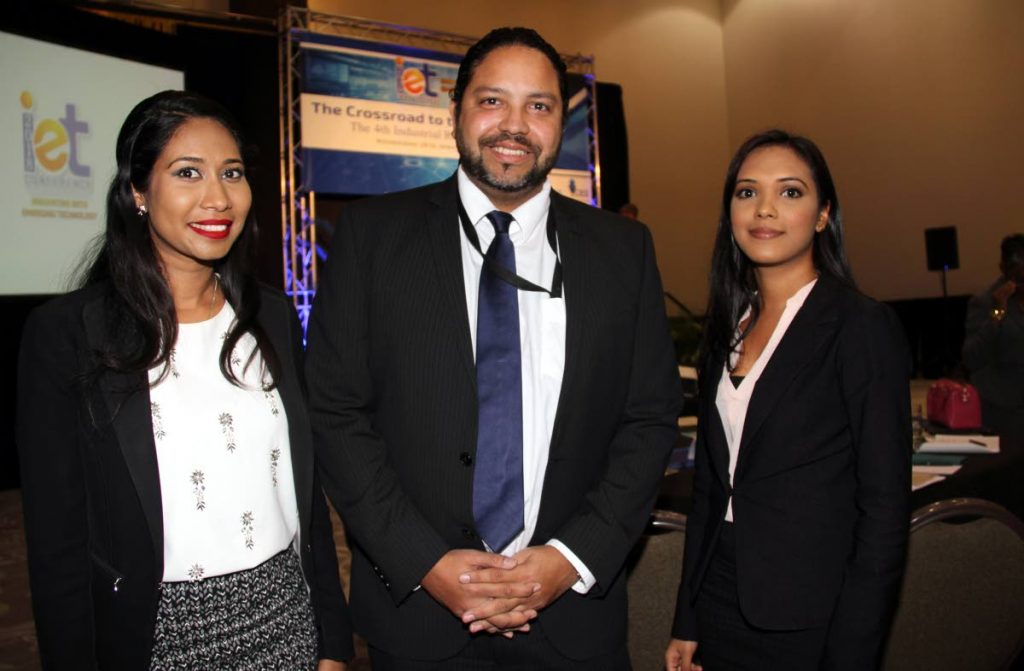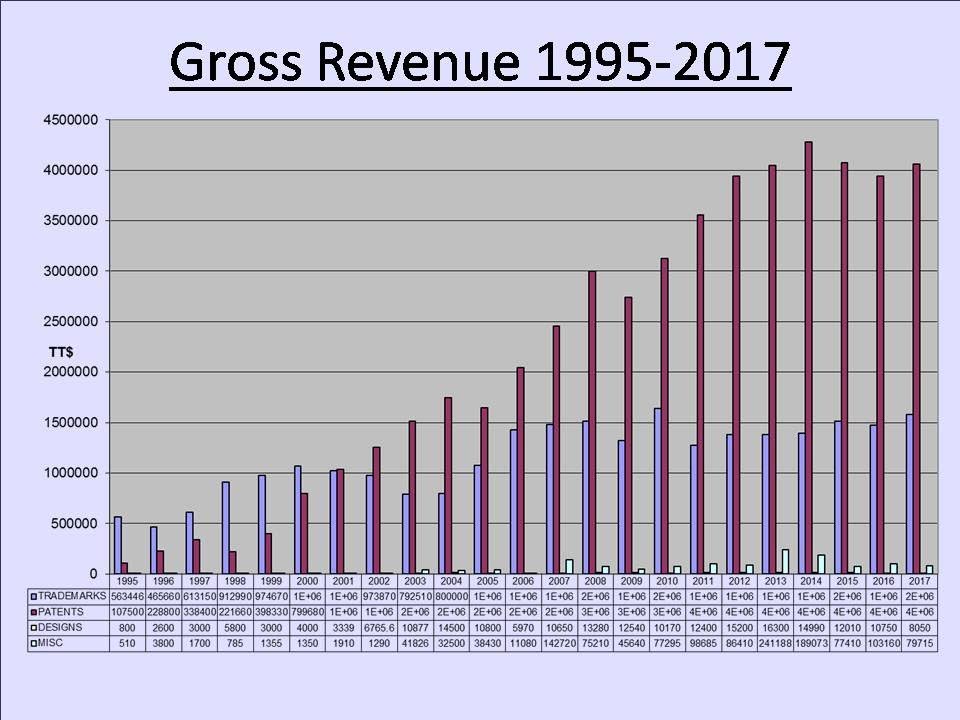Protecting the brand

Intellectual Property (IP) and technology-related industries are the future of economic diversification in TT, says Regan Asgarali, Controller of the Intellectual Property Office of TT (TTIPO).
"We've contributed more than $48.4 million over the last ten years or so to the economy from the payment of patent annuities and trademarks filings. Plus, there are IP-related services that could bring in foreign exchange."
From 1995-2005, TTIPO earned $18.7 million in gross revenue, while from 2006-2015 it earned $48 million. Asgarali told Business Day this "illustrates our growth and revenue capacity."
Diversification away from TT's energy sector has regained momentum in recent times, following the drop in oil and gas prices. Avenues such as export promotion, health tourism and business process outsourcing are more often talked about, but Asgarali explained why more attention should be paid to IP.
For instance, he said, it costs almost $92,000 in total to file and maintain a 20-year patent with TTIPO (see box for year-by-year breakdown or log on to www.ipo.gov.tt/how-to/apply-for-a-patent.html)
Having paid an initial patent application fee of $2,000, you are granted protection by the State for two decades, however to maintain your patent for the period, you must pay an annuity. Starting at $200 for the second year, the annuity increases incrementally, with a final payment of $13,200 in the 20th year.
"This works out to be rather affordable over the lifespan of the patent," Asgarali said.
Intellectual property, as defined by TTIPO, refers to the expressed creation of the human mind. Examples include brands, inventions, designs, songs and other intellectual creations. Applications for patents, trademarks, industrial design, new plant varieties, geographical indications, trade secrets and integrated circuits can all be filed with TTIPO.
The number of patents filed with the TTIPO has grown steadily between 1995 and 2017. Trademark applications typically outnumber patents in TT. However, over the last 17 years more patent applications have been filed, while trademarks have remained fairly steady at one third to half of that.

TTIPO has therefore been earning revenue for government – it is a department of the Ministry of the Attorney General and Legal Affairs.
Asgarali said this could further change if Cabinet approves regulations under the new Trade Marks Act.
"The new Trade Marks Act allows for a steady increase in fees earned. It also provides for electronic filing of documents and will also allow for non-traditional trademarks such as those which cover smell and sound. The regulations are currently being reviewed. Once Cabinet approves them, another note will be done for the President to proclaim the Act.
"We are also working with WIPO (World Intellectual Property Organisation) to introduce an intellectual property teaching academy here and to enable TT nationals to access IP and technology-related alternative dispute resolution options through the Geneva-based WIPO mediation and arbitration centre. These are very exciting projects that hopefully will come on stream later this year or early next year."
Asgarali also spoke of the December 2017 launch of the TT Intellectual Property Library at TTIPO's offices, 3rd Floor Capital Plaza, 11-13 Frederick Street, Port of Spain.
The library carries the latest IP and technology material, as it is supported with WIPO’s publications. There is also a technical library as part of the main library where TTIPO teaches individuals and businesses to utilise available patent data to assist them in their projects.
Business Day also spoke with TTIPO technical examiners Neetu George-Ramsaran and Sharmila Ganpat.
Commenting on patents as a growing revenue source, Ganpat said most applications have come from people or companies outside of TT.
"For the past three to five years we have been making approximately $4 million each year from patent revenues. One per cent is local applications and 99… foreign. We make that revenue based on the 20-year protection or annuities, where payments go up each year."
Seeking to increase the number of patent and other IP filings by TT nationals, TTIPO has held a series of IP clinics in conjunction with agencies such as ExporTT, the Caribbean Industrial Research Institute (CARIRI) and major universities.
The ability to file trademarks on things like sounds and scents is not an option in TT, but George-Ramsaran said this could soon change.
"There was a repeal and replacement of the original Trade Mark Act, so where before it just covered signs and logos, it would now include scents, taste, colours, trade dress. We expect the Trade Mark Act No. 8 of 2015 will be proclaimed this year or next year."
Patent holders are given a written notice, via letter, if they are late with their annuity payment. George-Ramsaran said TTIPO expects to introduce an automated online service in July.
This was partly why TTIPO, in collaboration with WIPO, hosted an Industrial Property Administration System (IPAS) Mission in April. Key areas included electronic communications, electronic publications and online filing.
TTIPO will also be testing out WIPO CASE (Centralised Access to Search and Examination) as part of its move toward electronic correspondence.
Asgarali said, "TT is at the cutting-edge of this because it will be trialled by us. What it will do, it serves as an electronic document management system (EDMS), which is critical to sending out email and to storing data. It will also allow for the creation of an online account for an agent or member of the public to file their trademark or patent.
"We are actually one of the first countries in Caricom to test this. The software became available in the last year and a half while this push really began within the last six to eight months."
TT was chosen because of its 20-year history of doing patent examinations and the fact it is fully compliant with the Trade-Related Aspects of Intellectual Property Rights (TRIPS), which deals with worldwide intellectual property rights.
Filing a geographical indication (GI) is another potential revenue earner. TTIPO defines a GI as any sign or symbol that identifies goods as emanating from any specific region or location of a country that gives the goods its known quality, reputation or characteristics that are essentially attributable to that region or locality. Champagne, Scotch whiskey, Parmesan cheese, Swiss watches and Mexico's tequila are all examples of GI. The first local GI was protected in 2017 for Montserrat Hills Cocoa, Trinidad.
Asgarali suggested a policy be developed for GI-themed tourism for what he referred to as the cocoa trails from Lopinot to Brasso Seco in northern Trinidad and the Montserrat region in central Trinidad.
"There's a two or three-kilometre trail from Lopinot to Brasso Seco. I've had discussions about this with Leon Granger, CEO of the Cocoa Development Company of TT Ltd. Paving this trail to create a road would allow TT to provide a unique tourism product, linking the Brasso Seco cocoa areas to the Lopinot cocoa areas. Tourists and locals both would get the chance to see the cocoa industry from start to finish, like 'dancing the cocoa'."
TTIPO is also in conversation with Lopinot and Brasso Seco farmers, with the goal of them filing for GI protection. Similar conversations are taking place in Tableland for pineapple and Moruga for hill rice.
For more information on TTIPO and its services, visit http://www.ipo.gov.tt/


Comments
"Protecting the brand"